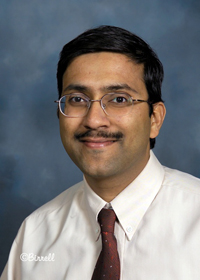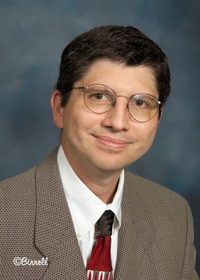 |
Apar Ganti, M.D. |
 |
Ralph Hauke, M.D. |
Locally, UNMC and Creighton University Medical Center (CUMC) were the two lead centers following SELECT patients. Under the UNMC arm of the study, the other three sites were Methodist Hospital, Midwest Urology and the Veterans Affairs Medical Center (VAMC). CUMC participated under the NCI Community Clinical Oncology Program of the Missouri Valley Cancer Consortium (MVCC).
A total of 113 men participated in the UNMC portion of the study, including 56 enrollees at UNMC, 44 at Methodist, eight at the VAMC and five at Midwest Urology. Another 177 men participated in the MVCC portion of the study. They included 41 enrollees at CUMC, 115 at the Cancer Resource Center in Lincoln, 10 at Bergan Mercy Medical Center, and 11 at Immanuel Medical Center.
Since May, Apar Ganti, M.D., has been the principal investigator at UNMC and VAMC. Larry Siref, M.D., headed the study for Midwest Urology and Stephen Lemon, M.D., led the study for Methodist Cancer Center.
Since January 2006, Gamini Soori, M.D., has been MVCC’s principal investigator and also headed the study at Bergan Mercy. Others heading the study at their respective institutions are Peter Silberstein, M.D., CUMC; Joseph Verdirame, M.D., Immanuel; and Sushil Lacy, M.D., Cancer Resource Center.
“The SELECT trial owes a tremendous debt to our volunteers, the men who offered their time and enthusiastic participation, all in the interest of a future when prostate cancer can be prevented,” said Ralph Hauke, M.D., the original principal investigator at UNMC and VAMC. Dr. Hauke, who now practices at Nebraska Cancer Specialists, continues to do research with UNMC and MVCC.
The study data, released in part on Oct. 27 and published online by JAMA on Dec. 9, also showed two trends: a small but not statistically significant increase in the number of prostate cancer cases among the over 35,000 men age 50 and older in the trial taking only vitamin E and a small, but not statistically significant increase in the number of cases of adult onset diabetes in men taking only selenium (10 percent for those taking selenium vs. 9.3 percent taking placebo). Neither of these findings proves an increased risk from the supplements and both may be due to chance.
|
|
SELECT participants received letters beginning in October explaining the results and telling them to stop taking their study supplements. Participants will continue to have their health monitored by study staff, which may include regular digital rectal exams and PSA (prostate-specific antigen) tests to detect prostate cancer.
Investigators intend to follow the participants for about three years to determine the long-term effects of having taken either supplement or placebo and to complete a biorepository of blood samples that will be used in extensive molecular analyses to give researchers a better understanding of prostate cancer, other cancers, and other diseases of male aging. This additional data collection is a vital part of the study.
Neither the men nor their physicians know whether they were taking active supplements or placebos, a procedure known as blinding or masking. As follow-up of the SELECT participants continues, the participants will continue to be blinded. A blinded follow-up avoids unintentional bias that could result in potentially false conclusions. However, upon request, participants will be informed if they were taking the active supplement or placebo.
“SELECT was always designed as a study that would answer more than a single question about prostate cancer,” said Eric Klein, M.D., a study co-chair for SELECT, and a physician at the Cleveland Clinic. “As we continue to monitor the health of these 35,000 men, this information may help us understand why two nutrients that showed strong initial evidence to be able to prevent prostate cancer did not do so.”
SELECT was undertaken to substantiate earlier, separate findings from studies in which prostate cancer was not the primary outcome: a 1998 study of 29,133 male smokers in Finland who took vitamin E to prevent lung cancer surprisingly showed 32 percent fewer prostate cancers in men who took the supplement, and a 1996 study of 1,312 men and women with skin cancer who took selenium for prevention of the disease showed that men who took the supplement had 52 percent fewer prostate cancers than men who did not take the supplement.
Based on these and other earlier findings, in 2001, men were recruited to participate in SELECT. They were randomly assigned to take one of four sets of supplements or placebos, with more than 8,000 men in each group. One group took both selenium and vitamin E; one took selenium and a vitamin E placebo; one took vitamin E and a selenium placebo; and the final group received placebos of both supplements.
Except for skin cancer, prostate cancer is the most common type of cancer in men in the United States. In 2008, there will be an estimated 186,320 new cases of prostate cancer and 28,660 deaths from this disease in the United States.
SELECT has been funded by NCI for $114 million, with additional monies from the National Center for Complementary and Alternative Medicine, and with sub-studies funded and conducted by the National Heart, Lung and Blood Institute, the National Institute of Aging and the National Eye Institute at NIH.
The sub-studies are evaluating the effects of selenium and vitamin E on chronic obstructive pulmonary disease, the development of Alzheimer’s disease, and the development of macular degeneration and cataracts, and these sub-studies will continue without participants taking study supplements. An NCI-funded sub-study is looking at the effects of the supplements on men who developed colon polyps.